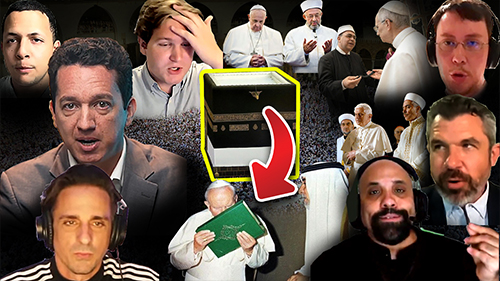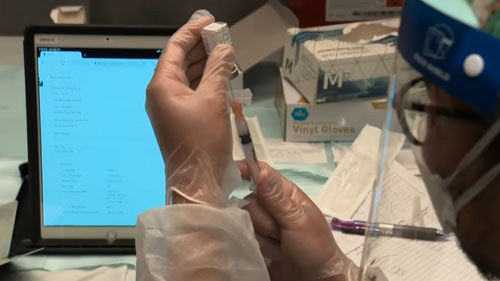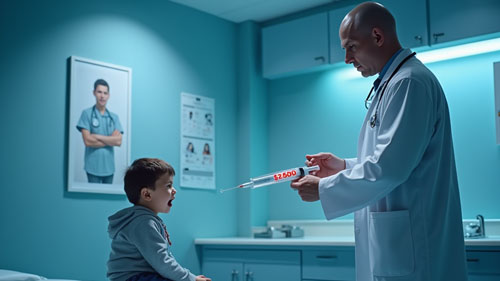| Recent Featured Videos and Articles | Eastern “Orthodoxy” Refuted | How To Avoid Sin | The Antichrist Identified! | What Fake Christians Get Wrong About Ephesians | Why So Many Can't Believe | “Magicians” Prove A Spiritual World Exists | Amazing Evidence For God | News Links |
| Vatican II “Catholic” Church Exposed | Steps To Convert | Outside The Church There Is No Salvation | E-Exchanges | The Holy Rosary | Padre Pio | Traditional Catholic Issues And Groups | Help Save Souls: Donate |  |









 " />
" /> " />
" /> " />
" /> " />
" /> " />
" />




The Miraculous Conversion of Alphonse Ratisbonne
Through the Intercession of the Blessed Virgin Mary
The written account of this was forwarded to us by a reader:
In November 1830, the Blessed Virgin Mary appeared to a young novice in the convent of the Sisters of Charity at Rue du Bac, Paris. The novice's name was Catherine Laboure'.
This was not the first time she had seen Our Lady, but it was the most significant. Our Lady appeared holding a globe, which she lifted while gazing prayerfully heavenward (signifying that she is praying for the entire world). Then the globe disappeared, and the vision changed. Our Lady extended both hands, from which rays of light streamed. Around her formed an arch with the words:
Our Lady asked that a medal be struck showing this vision. On the back of the medal, she asked for the depiction of two hearts (hers and Christ's), with a cross surmounting the letter M. She promised that God would grant great graces through this medal to Christians who would wear it prayerfully.
With great difficulty, Sister Laboure' convinced her confessor to arrange for the striking of the medal. It was finally approved, struck, and circulated.
Originally known as the Medal of the Immaculate Conception, it quickly became known as the Miraculous Medal, because so many miracles of healing and conversion attended those who wore it. Nonetheless, although the Pope himself possessed a Miraculous Medal, it was initially most popular in France; it did not become firmly established at Rome and worldwide until after the miraculous conversion of Alphonse Ratisbonne....
Rue de Bac, Paris, where the Miraculous Medal was first revealed to St. Catherine Laboure
Fast-forward to January 6, 1842. Alphonse, a young Jewish banker, has just arrived in Rome. The scion of Strasbourg's most important Jewish family, he is a man of the world: wealthy, refined, sophisticated, agnostic (a former atheist)...a friend of the Rothschilds, entirely at ease in the salons of the nobility. At 28, he is engaged to his own niece, Flore Ratisbonne, whom he plans to marry the following August. Right now, he is touring Europe and the East, partly for pleasure and partly for his health -- one last fling before settling down with Flore and assuming a partnership at his uncle's bank.
Alphonse hasn't intended to visit Rome. He is fiercely anti-Catholic: As he himself puts it, the very name of the Jesuits provokes him to fury. He has always harbored this antipathy to Catholicism, but it has intensified exponentially since his elder brother, Theodor, became a convert and subsequently (gasp!) a priest.
Therefore, the very last place in the world Alphonse wants to visit is Rome. But somehow he has ended up here. At Naples, he'd somehow stumbled into the wrong ticket line...and in a fit of pique, even after he realized what was up, he remained there and booked his passage on the steamer to Rome. So here he is, making the best of it, avidly touring Roman ruins and museums in the company of a paid guide.
Suddenly he hears his name called and wheels around. It is his old classmate from Strasbourg, Gustave de Bussieres, a Protestant. (Alphonse doesn't mind Protestant chums; it's just Catholics he objects to. )
The two eagerly rekindle their friendship. Later, when Alphonse calls on Gustave, he encounters the latter's older brother, the Baron Theodor de Bussieres, a convert to Catholicism and a close friend of Alphonse's priest-brother. Alphonse feels instinctive abhorrence toward this zealous Catholic convert, but he knows the baron is an expert on Constantinople (which Alphonse plans to visit) so he rashly agrees to call upon him for travel advice.
This hasty promise proves to be Alphonse's undoing.
Within the next day or two, Alphonse visits the Church of the Aracoeli, where the "chants solennels" stir him deeply; he is so moved he weeps, although he can't put his finger on what it is that has touched him. Directly afterward, though, he visits Rome's notorious Jewish ghetto, where the palpable misery of his people renews his fury against everything Catholic.
From there, he goes to pay his call on the Baron de Bussieres. He doesn't intend to actually visit, though. Rather, he will merely leave his card and depart. But the baron's doorman mistakes Alphonse's intention and bustles him into the drawing room, where the baron, his wife, and his young daughters are en famille.
At first, the baron and Alphonse merely exchange meaningless pleasantries. Then Alphonse happens to mention his visit to the Aracoeli; he recounts the strange emotion he felt, the vague religious awakening....
Suddenly he notices the baron's eager expression, which seems to say: "You will be a Catholic someday!" Repelled by the baron's zeal, Alphonse describes his visit to the Jewish ghetto. He launches into a vicious attack on the Catholic Church, which he holds responsible for all the misery endured by Jews since the time of Christ.
Unfazed, the baron responds by extolling the glories of Catholicism. Alphonse replies sarcastically, openly ridiculing Catholic "superstition." Only the presence of Mme. de Bussieres and the children keeps him from outright blasphemy.
Finally, the baron makes an extraordinary proposition.
"Since you abhor superstition and espouse such liberal views," he asks Alphonse, "would you consider submitting to a simple test?"
"What test?"
"To wear something I'm going to give you. It's a medal of the Holy Virgin. It appears quite ridiculous to you, no doubt. But as for me, I attach great importance to it." And he shows Alphonse the Miraculous Medal attached to a cord.
Alphonse is dumbstruck. He can scarcely believe the baron's impertinence. But as a man of the world, he doesn't want to seem to be making too much of a trifle. So he consents, breezily quoting a line from The Tales of Hoffman: "If it does me no good, at least it will do me no harm."
The baron's little daughter puts the medal around Alphonse's neck. And Alphonse breaks into laughter: "Ah! Ah! Me voila catholique, apostolique et romain!"
But the baron presses further. Merely to wear the Medal isn't enough, he says. Alphonse must also agree to pray a simple prayer, the Memorare of St. Bernard.
This is too much. "Laissons ces sottises!" exclaims Alphonse -- "Let's stop this foolishness!" For the mention of St. Bernard has reminded him of his brother, Abbe' Theodor Ratisbonne, author of a biography of the Cistercian saint. Anything that reminds Alphonse of his traitor-brother arouses his rage.
However, the baron persists. If Alphonse refuses to pray this short prayer, he insists, he'll thereby render the whole "test" null and void. So, Alphonse consents. At the Baron's behest, he even agrees to copy out the Memorare. Then he pockets it and leaves, greatly amused at the entire absurd episode.
But later that night, when he mechanically copies the prayer, something happens. He can't get the words of the Memorare out of his mind. They haunt him, he recounts later, like an annoying tune one can't dislodge from one's head. Over and over again, with mounting irritation, he murmurs this obtrusive prayer of St. Bernard.
Several times, during the following days, the baron takes Alphonse sightseeing. Always, no matter what monument they're visiting, the baron manages to work the conversation around to the subject of religion. This annoys Alphonse, but he's unflappable. Often, he lightly deflects the Baron's proselytism with raillery bordering on blasphemy.
At one point the baron assures Alphonse, "I'm convinced you'll one day become a Christian...even if the Lord has to send an angel from Heaven to bring it about."
"A la bonne heure," Alphonse responds drily, "car autrement la chose serait difficile." (The delicate French sarcasm of these words is truly untranslatable, but here's the gist: "The sooner the better, for otherwise the matter would be rather difficult." [Imagine the lip very slightly curled in a sneer...])
On the same occasion, as the carriage passes the Scala Sancta, the baron suddenly removes his hat and exclaims, "Hail, holy steps! Here is a future penitent who will one day ascend you on his knees!"
This staggers Alphonse. He cannot believe his companion is saluting "a bunch of stupid steps." A few minutes later, as they pass through the delicious gardens of a local villa, Alphonse doffs his own hat and parodies the baron: "Hail, true glories of nature! It is to you we should pay homage and not to a stupid staircase!"
In fact, the baron's relentless proselytism is starting to get on Alphonse's nerves. Far from drawing him toward Catholicism, it is repelling him further. Yet the baron, undaunted, persists.
But the baron is not relying on argument alone. He's also praying very hard. And so are his friends, his fellow members of Rome's tight-knit community of aristocratic French expatriates. Notable among these friends is the Comte de la Ferronays, ex-diplomat, once a notorious roue' and now a devout, fervent Catholic.
Moved by the baron's pleas, the Comte drops into a church and fervently prays "more than 20 Memorares" for the conversion of the "young Jew."
That very same evening, the Comte suffers a fatal heart attack. After receiving his final Sacraments, he dies devoutly, surrounded by his loving family.
Now the stage is set for the conversion of Ratisbonne.
It is the night of January 19-20. Alphonse plans to leave Rome the following day. In the middle of the night, he is abruptly awakened. At the foot of his bed, he sees a large Cross (not crucifix), quite distinct, "sans Christ." He tries to shake the unwelcome sight, but he can't. No matter where he looks, there it is. Even when he closes his eys, he sees it. At last, exhausted, he falls asleep. When he awakens in the morning, he has forgotten his night-vision.
Alphonse packs, breakfasts, and goes out to pay his farewell calls. He runs into his pal Gustave, and the two discuss an upcoming religious ceremony, the papal Blessing of Animals at St. Peter's. They're both greatly amused by the whole notion of such a ceremony, so they take this opportunity to mock and deride Catholicism. "There followed a volley of jests and witticisms," Alphonse later reports, "such as you'd imagine between a Jew and a Protestant."
After leaving Gustave, Alphonse stops at the Cafe Greco to read the newspapers. He runs into a few more expatriate friends, and they chat of frivolous things such as the brilliant ball given the previous evening. Then Alphonse exits into the brilliant Roman sunshine. It is just after noon.
Within moments, he encounters the carriage of the Baron de Bussieres. The baron invites him inside for one final sightseeing tour. But first, de Bussieres explains, he must stop at the Church of San Andrea delle Fratte for a quick errand. A dear friend of his, the Comte de la Ferronays, has just died, he says, and he must finalize the funeral arrangements.
They stop at the church. De Bussieres says he'll be only a few minutes, so Alphonse should wait in the carriage with Mme. de Bussieres, but Alphonse decides instead to come inside to see the church interior.
There's not much to see. The church is "poor, bare, and ugly," devoid of distinctive art or architecture. Alphonse looks around mechanically as de Bussieres hurries away to consult with the friars.
Alphonse is alone. Suddenly a large black dog bounds menacingly in front of him. But then, in the next moment, the dog disappears. In fact, everything disappears, as if a veil has been drawn over the church interior. A brilliant light blazes from a side chapel, the Chapel of the Archangels. It's as if all light has been concentrated at that one spot.
And in the center of the light, Alphonse sees her. She is standing on the altar: "tall, brilliant, full of sweetness and majesty." She is so blindingly beautiful that, after one glance at her face, he casts down his eyes. Repeatedly he tries to raise his eyes again, to behold that beautiful face. But he cannot. He can't raise his eyes past the level of her hands, which are outstretched, with light streaming from her fingers -- just as in the image on the Miraculous Medal.
But her hands are very expressive. To Alphonse, they speak of "all the tenderness of the Divine Pity."
With one hand, she gestures to him to approach. He does so, on his knees. After he has advanced a few paces, she gestures again, as if to signify: "Enough--that's good!"
Then, as he gazes on the light streaming from her fingers, he receives the gift of Infused Knowledge. Faster than thought, he understands all: his own profound sinfulness (especially the enormity of Original Sin); God's infinite love and mercy toward poor sinners, revealed in the Incarnation and Crucifixion; the beauty and truth of Catholicism; the reality of Christ's Real Presence in the Blessed Sacrament.
A Jewish agnostic reared in a skeptical milieu, he has never even heard the term "Original Sin"; now he instantly knows what it is, more profoundly than if he'd been studying the subject for years.
The entire experience takes mere moments.
The Baron de Bussieres returns from his conference with the friars. He looks around the nave. Where is Ratisbonne? Finally, he spots the young man: slumped, kneeling, with his head against the altar rail in the Chapel of the Archangels.
The baron approaches. Once, twice, a third time, he taps Alphonse on the shoulder. No response. Finally Alphonse is roused. He turns toward the baron "a face bathed in tears," clasps his hands together, and exclaims, "Oh! How that gentleman has prayed for me!"
"That gentleman" is the Comte de la Ferronays, whom Alphonse has never met. No one has told Alphonse that the Comte had been praying for him. Rather, it has just been revealed to him...in the same supern "That gentleman" is the Comte de la Ferronays, whom Alphonse has never met. No one has told Alphonse that the Comte had been praying for him. Rather, it has just been revealed to him...in the same supernatural light wherein he has received infused knowledge of Catholic Truth.
De Bussieres is stunned. He begs Alphonse to explain himself, but Alphonse cannot. He is sobbing too hard, murmuring between sobs, "How happy I am! How good God is! How unbelievers are to be pitied!"
The baron helps Alphonse outside and into his carriage. He takes him to the Hotel Serny, where Alphonse is staying, and loosens his cravat so he can breathe. But Alphonse is still sobbing, clasping his Miraculous Medal, murmuring thanks to God. At last he turns to the baron, embraces him, and with a face "presque transfiguree" says: "Take me to a confessor! When can I receive baptism, without which I can no longer live?"
"What has happened?" exclaims the baron. "What have you seen?"
"That," says Alphonse, "I can reveal only on my knees and to a priest."
So...the baron takes him to the Gesu, the Jesuit mother-church, to see Pere de Villefort. There, Alphonse tries to explain himself, but he is still sobbing so hard that he is unintelligible. At last he calms down, takes the Miraculous Medal from his neck, holds it up, and cries: "Je l'ai vue! Je l'ai vue!"
Then, as the baron and the priest listen in amazement, Alphonse recounts the whole story. He concludes with an enigmatic statement that strikes his listeners forcefully: "Elle ne m'a rien dit, mais j'ai tout compris!"
"She spoke not a word, but I understood all."
Eleven days later, Alphonse is baptized at the Gesu. Everyone who is anyone is there, for the news of Alphonse's conversion has caused a sensation. (His family is renowned throughout Europe.) Attendees strain to catch a glimpse of the young convert, but he is oblivious. All he cares about is baptism...and then, the Holy Eucharist. He is so overcome by the experience of receiving the Eucharistic Lord that he has to be sustained by de Bussieres, his baptismal sponsor, while returning from the altar to his place.
The following month, the Vatican holds a canonical process to investigate the circumstances surrounding Alphonse's conversion. After lengthy investigation and many depositions, it concludes that his sudden conversion was entirely miraculous -- an act of God wrought through the powerful intercession of the Virgin.
The conversion of Ratisbonne is widely perceived as a confirmation by Heaven of the efficacy of the Miraculous Medal. The devotion spreads...and spreads....
The following July, Alphonse enters the Jesuits. He spends 10 fruitful years in the bosom of the Society. Then, with papal permission, he leaves to help his brother Theodor found the Congregation of Our Lady of Sion, dedicated to the conversion of the Jews. Alphonse spends the rest of his life as a holy priest, laboring among Jews and Arabs in the Holy Land. He establishes orphanages and schools for poor children, builds the Church of the Ecce Homo, and lives a life of extraordinary sanctity. He dies at Ain Karem, reputed site of the Visitation. On his deathbed, he goes into ecstasy -- apparently seeing, one last time before death, the Lady of the Miraculous Medal.
(major sources were Alphonse's own account of his conversion, the Baron de Bussiere's account, and a book by Fr. Rene Laurentin, Le 20 janvier 1842, Marie apparait a Alphonse Ratisbonne.)
Sign up for our free e-mail list to see future vaticancatholic.com videos and articles.
Recent Content
^